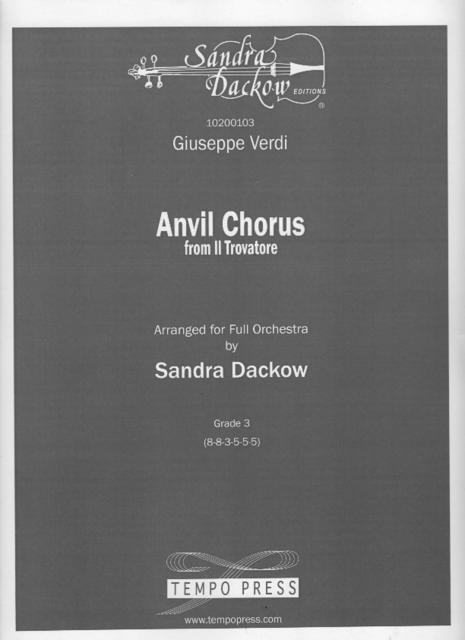Anvil Chorus -from Il Trovatore
Buy this item (in stock)
Product ID: TE1 10200103
By Giuseppe Verdi
Publisher:
Tempo Press
Arranger:
Dackow
Series:
Sandra Dackow Editions
Genre:
Romantic Era
Line Up:
Symphony Orchestra
Level: 3
Set & Score
This item is in stock
About this item
This work has been carefully edited so that it can be
performed by intermediate full orchestras. First violins, cellos and
basses have a few shifts into positions, while second violin and viola
parts can be played entirely in first position. Woodwind and brass
parts are edited with fingerings, slide positions and courtesy
accidentals for the benefit of those students without extensive playing
experience in sharp keys. And don’t forget the anvils!! This is a great
opportunity to have a “guest” percussionist (a principal,
superintendent, local celebrity, etc.) join the orchestra.
Reviews and rating
No review available, be the first to write one!

Composer
Giuseppe Verdi (1813-1901)
Giuseppe Fortunino Francesco Verdi (10 October 1813 – 27 January 1901) was an Italian Romantic composer, mainly of opera. He was one of the most influential composers of the 19th century. His works are frequently performed in opera houses throughout the world and, transcending the boundaries of the genre, some of his themes have long since taken root in popular culture – such as "La donna è mobile" from Rigoletto, "Va, pensiero" (The Chorus of the Hebrew Slaves) from Nabucco, "Libiamo ne' lieti calici" (The Drinking Song) from La traviata and the "Grand March" from Aida. His work has sometimes been criticized for using a generally diatonic rather than a chromatic musical idiom and for being essentially melodrama during his early years.
Verdi’s masterworks dominate the standard repertoire a century and a half after their composition.
More info about the composer...



 Click above to view samples
Click above to view samples
